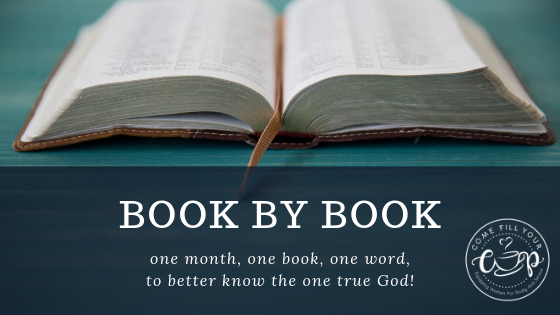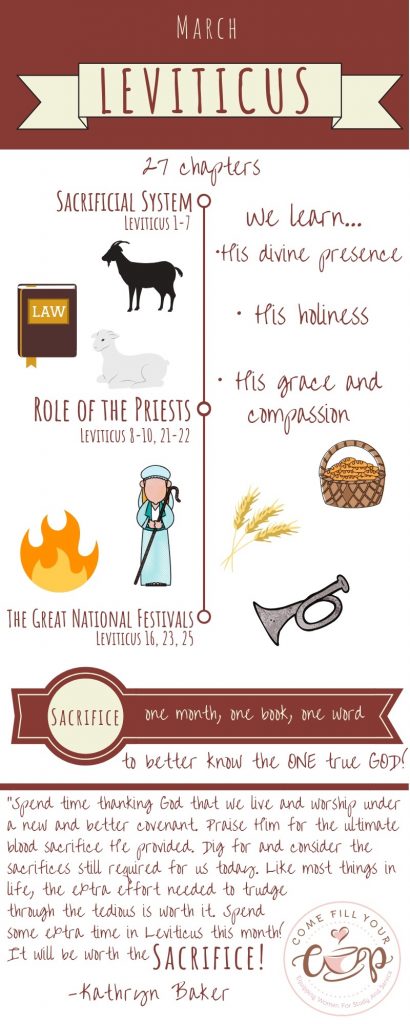L

When describing the Book of Leviticus, the word tedious comes to mind. Without main characters or major events to follow through the book, it can be tempting to throw in the towel after reading the first few chapters. If you’ve never read through the book in its entirety, you aren’t alone, but here’s another chance! As you wade through the instructions for the sacrificial system (Lev. 1-7), the role of the priests (Lev. 8-10, 21-22) and the great national festivals (Lev. 16, 23, 25) just keep reminding yourself – there is so much to learn about The Instructor!
Leviticus takes place where Exodus leaves off. The children of Israel are camped near Sinai, they have received the ten commandments and built the tabernacle. Now, given over the course of a month, the 27-chapter guidebook will show them how to worship, serve, and obey a Holy God. Looking at the key words: Holy, Sacrifice, Clean/Unclean, and Atonement it’s clear that the book’s overall theme answers the question: “How may a sinful man approach a holy God?” What a blessing that God has provided us a more excellent way to be holy so that we can approach him! Notice some brief observations about the great God we serve from the Book of Leviticus.

His divine presence. God proclaimed His desire to be present with His people in the book of Exodus (Exo. 25:8), and this theme continues through Leviticus. Notice that every act of worship took place “before the LORD” (e.g., Lev. 1:3,5), who dwelled with His people in the Tent of Meeting. It is the one of the greatest of God’s gifts that He consents to dwell with His people (Lev. 26:12), but also a stark reminder that though we worship Him differently under the New Covenant, our sacred acts are also being offered “before the LORD”.
His holiness. Leviticus teaches us that God is a God of details and specifics, not just a God of the big things where we tend to relegate Him. From the details of skin diseases to the type of animals that could be consumed, it is very clear what His expectations were for the Israelites. There is clear distinction between clean and unclean; holy and profane. The reason for it is given in the key verses in Leviticus – “Be holy, because I am holy” (Lev. 11:45; 19:2). Human beings are meant to be like God in His character. That involves imitating God in daily life. God is no less concerned with the details today, throughout every dispensation, He has never left it up to man how we are to worship Him – it begins with our holiness!
His grace and compassion. Many take aim at the strict regulations and harsh punishment given by God in this book and throughout the Old Testament, but what’s also very clear in these chapters is His compassion and care for His people. By His grace, He provided the Israelites in detail, what was needed to know and do in order to approach Him. He took care to provide for those that were less fortunate. The fields were to be left to for gleaning, and the requirements for sacrifice were made affordable for the poor. It’s important to note, that while the poor could give turtle doves instead of a more expensive animal, their economic status did not negate their need for and requirement to sacrifice in order to receive atonement. We serve that same compassionate God! It’s comforting to know that no matter what station we find ourselves in life, it will always be within our ability to obey God!
For our challenge this month the word is: sacrifice. You cannot study the book of Leviticus without it. The concepts of sin, sacrifice, and atonement found in this book are essential for interpreting the death of Jesus in the New Testament. This time, the goal is not to find every instance of the word, there are many. Instead, the challenge is one of introspection, comparison, and thanksgiving. As you read through the details of the 5 types of offerings and instructions for daily living, take notice of what constituted a “sweet aroma” versus what caused one to be “cut-off”. Spend time thanking God that we live and worship under a new and better covenant. Praise Him for the ultimate blood sacrifice He provided. Dig for and consider the sacrifices still required of us today (e.g., Heb. 13:15-16; Rom 12:1ff). Like most things in life, the extra effort needed to trudge through the tedious is worth it. Spend some extra time in Leviticus this month! It will be well worth the sacrifice!
Kathryn Baker
- Book by Book: Esther - November 18, 2020
- Book by Book: Nehemiah - July 22, 2020
- Book by Book: Ezra - May 27, 2020
 Welcome! We are so glad you stopped by. Come Fill Your Cup is a group of Christian ladies dedicated to equipping women for study and service. We know you are busy and that life’s hectic pace pulls you in so many directions, but you can’t truly be the woman God desires unless you take time to fill your own cup…not with spa days (though we love a good spa!) or the latest novel…but with God’s Holy Word. We want to help you with that! Our goal is to reach you in the midst of your busy day and give you encouragement, education, and fellowship as you strive to live the life God has laid before you. Our prayer is that we can help fill your cup so that you, in turn, can overflow to all those around you. So, as we like to say…come fill your cup, and let it overflow!
Welcome! We are so glad you stopped by. Come Fill Your Cup is a group of Christian ladies dedicated to equipping women for study and service. We know you are busy and that life’s hectic pace pulls you in so many directions, but you can’t truly be the woman God desires unless you take time to fill your own cup…not with spa days (though we love a good spa!) or the latest novel…but with God’s Holy Word. We want to help you with that! Our goal is to reach you in the midst of your busy day and give you encouragement, education, and fellowship as you strive to live the life God has laid before you. Our prayer is that we can help fill your cup so that you, in turn, can overflow to all those around you. So, as we like to say…come fill your cup, and let it overflow!
Leave a Reply